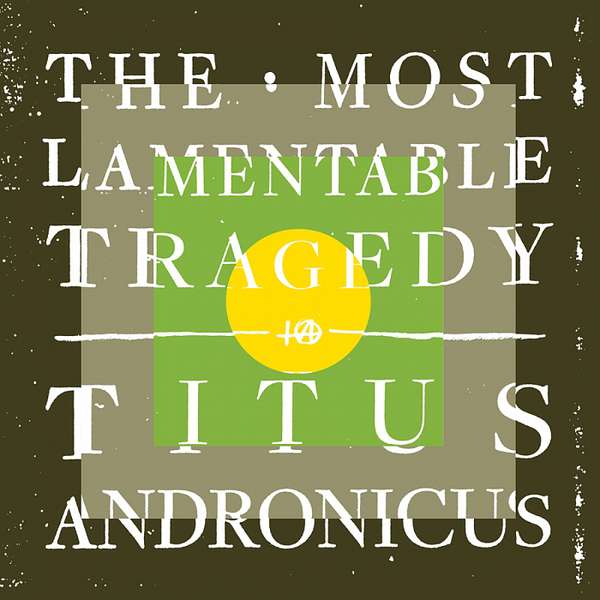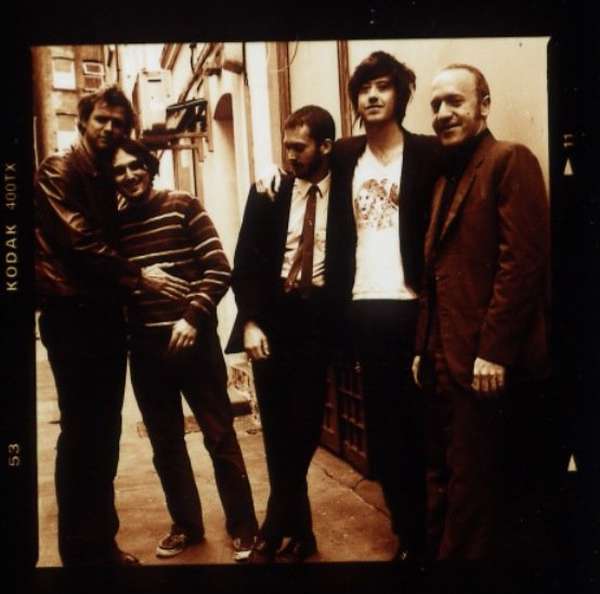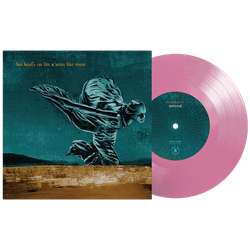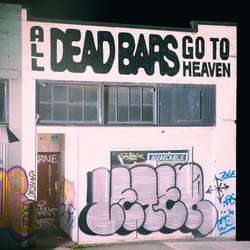Since The Most Lamentable Tragedy is a rock opera, an obvious question is what this opera is about. Stickles’ vocals are extremely growly, and I actually really like the texture they add to the music, but most times it’s absolutely impossible to understand what Stickles is saying (and this is probably the main reason I’m giving this album a 9.5 instead of a 10). Maybe the vocals were intentionally incomprehensible, though, because if you’re a +@ fan you’ll probably look up the lyrics for this album and find that Stickles meticulously annotated the lyrics on genius.com already. There he lays out the whole story, the weird +@ references you might not get right away, and more. It takes away a bit of the mystery of the rock opera, but it also helps you immediately appreciate the purposeful genius that went into the album, which makes the name of that lyric website particularly appropriate.
So because the genius.com lyrics are out there, I’m not going to bother taking a stab at what this rock opera is about (what’s the point in analyzing Lolita when there’s The Annotated Lolita?) There are a few theater motifs going on - in particular the silent “intermission” track and ambient tracks like “Please” and “The Fall” that divide up the five acts of the “play” - and this is pretty cute. We’ve already known for three years that this album would be about manic depression, but damn does Stickles construct a sharp portrayal of it. The single “Dimed Out” does an amazing job of not only depicting mania but also nearly forcing the listener to experience it. I wouldn’t be surprised if angsty teens (at heart) start using The Most Lamentable Tragedy to try to explain to their friends or even themselves what manic depression is like.
But, surprisingly, this album is more than just a “FEEL MY ANGST!!!” rant (and we already know Stickles knows how to rant); it provides some pretty positive messages, which is pretty odd for a band who opened their last album with the matter-of-fact line “Okay I think by now we’ve established that everything is inherently worthless.” I mean, the last song of the album is called “A Moral,” which must mean there’s something you’re supposed to get out of this album, right? There’s the fuck-those-who-put-you-down single “Fired Up,” whose message is reminiscent of Springsteen’s “Badlands.” “(S)He said / (S)He said” has an obvious gender ambiguity that makes lines like “I want to fuck someone” a lot more interesting. The ambiguity continues on “Funny Feeling,” which features the +@ tendency to shout a meaningful line over and over again: This time the line is “I can control something inside of me,” where Stickles’ says the “something” is a blank space that anyone can fill in with whatever tends to fuck them up. And the penultimate song “Stable Boy” - played in the chord-organ style of Daniel Johnston - gives a final message that’s best summarized with Stickles’ tweet-like annotations for the lyrics: “We won’t kill ourselves #REALTALK Promise +@.”
Obviously there’s a lot going on with the lyrics, but interestingly The Most Lamentable Tragedy isn’t a hot stew of literary and history references, a first for the band named after a Shakespearean play. However, the band still follows the “good artists copy, the best artists steal” mentality, pulling widely and wildly from the punk rock canon. Sometimes the stealing is blatant: “I Lost My Mind (DJ)” is a Daniel Johnston cover and “A Pair Of Brown Eyes” is a Pogues cover. And sometimes it’s a bit more subtle: The Irish-tinted “Come On, Siobhán” is likely a nod to the Celtic-tinted Dexys Midnight Runners and their ultra-famous “Come on Eileen,” while the cleverly titled song “[seven seconds]” (literally seven seconds of silence) is a nod to hardcore punk band 7 Seconds. I want to take a step back for a second (or maybe seven seconds?) and say that it’s pretty amazing that +@ fit two covers into a rock opera. The Pogues cover fits nicely with the Celtic theme going on, and is particularly interestingwhen you think about The Pogues’ and +@’s history with each other. And the Johnston cover seems to actually be the heart of the album - the phrase “I lost my mind” is repeated everywhere, and +@ even wrote their own song (simply titled, “I Lost My Mind (+@)”) as a kind of response to the Johnston original. And just go listen to the original - it’s just a piano and extremely lo-fi vocals. +@ turned this quiet heartbreaker track into a foot-stomping jam. The fact that Johnston is schizophrenic adds yet another dimension to this manic-depressive rock opera.
And +@ doesn’t just steal from others - they flat-out steal from themselves. “I’m Going Insane (Finish Him)” is a reprise of “Titus Andronicus vs. The Absurd Universe (3rd Round KO)” from Local Business. “More Perfect Union” is an obvious nod to “A More Perfect Union” from The Monitor; and “Mr. E. Mann,” while a clever double entendre, is also a reference to “(I am the) Electric Man” from Local Business. But probably the most interesting +@ reference in The Most Lamentable Tragedy is the continuation of the “No Future” tale. +@’a debut album The Airing of Grievances featured songs “No Future Part I” and “No Future Part II” while The Monitor featured Part III; The Most Lamentable Tragedy gives us Part IV and Part V. Incorporating a five-part song that’s been going on throughout +@ history into a five-act rock opera reminds me of David Foster Wallace making readers rummage through pages of footnotes that were their own short stories. This is the kind of high-level meta-music crap that makes a nerd/snob like me drool.
Snobby intellectualism aside, there is fantastic punk music throughout this album. And it seems like pretty much every corner of punk rock is touched. The opener, “No Future Part IV: No Future Triumphant” is as straight-forwardly catchy as “American Idiot;” “Look Alive” and “Lookalike” are 30-second hardcore drills that could fit in Hüsker Dü's Zen Arcade; the piano, horn, and glockenspiel combos on “Mr. E. Mann” and “Fired Up” scream the Springsteen love that +@ obviously has; “Funny Feeling” has touches of post-rock evoking the final minutes of an Explosions in the Sky song; “Into The Void (Filler),” whose one-two punch power chords make it by far the most driving song on the album, reminds me of early ...And You Will Know Us By The Trail of Dead; and the angsty piano ballad “No Future Part V: In Endless Dreaming” is similar to the quiet-down-but-stay-upset moments of The Replacements’ albums. There are even totally not at all punk moments, like the choral “Sun Salutation” and “Auld Lang Syne.”
This is such a successfully ambitious album that I wouldn’t be at all surprised if this is the last we’ll hear from +@; that’s the rumor, at least. That makes it even more necessary to hear this album live as the band goes on tour. I can’t imagine how crazy the crowds are going to get during the end of “(S)He Said / (S)He Said” or shouting the cathartically repetitive “It’s alright” during “Mr. E. Mann” or openly yelling “I look alive but inside I’m dead” during “Look Alive.” If you like this album, you better see +@ in concert. The Most Lamentable Tragedy and the resulting live shows are beautiful moments in music history, but they won’t last forever. Cherish them.








